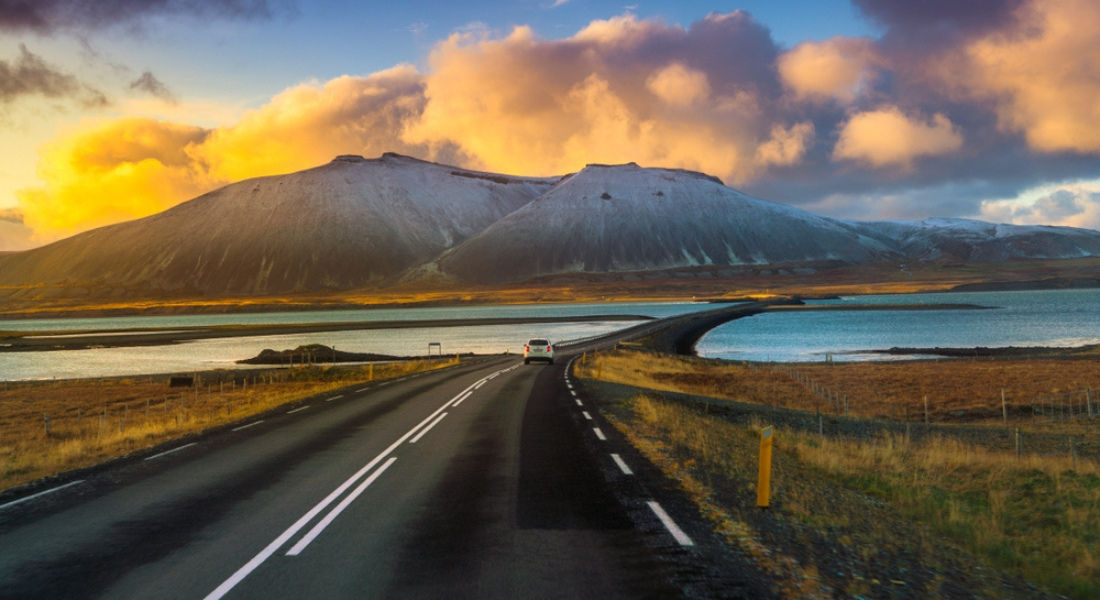The practical guide to driving in Iceland
Are you planning a road trip in Iceland and are you hesitating in your choice of vehicle? Do you want to learn more about the road network and traffic conditions for this unique destination?
Here is our guide to driving in Iceland, to begin your journey in the best conditions.
Iceland's road network

The must-do route in Iceland is the famous Route 1. It forms a loop around the island, making it easy to connect all of the country's major points of interest.
During your journey, it will be very tempting to stray off the beaten path to explore the vast network of tracks and secondary roads that Iceland offers. The most famous are the F roads, which traverse the interior of the island, often the only option for admiring the highlands or the Western fjords.
Depending on weather conditions, most of these roads open between mid-June and early July and can be closed from mid-September or October.
Choosing the right vehicle and package

A standard model car is perfectly sufficient for driving on Route 1 in summer. It's an essential paved artery for the island's life, so the official services take great care of it throughout the year.
To explore the secondary roads, an all-terrain vehicle is mandatory, with tires that grip well on both gravel and dirt. Some tracks involve crossing several fords and require being comfortable driving on rough roads.
But beyond the choice of vehicle that will accompany you on your adventure, pay close attention to the insurance terms you sign up for. Are you covered in case of a sandstorm, gravel ricochet, or ford crossing? If you book a nice all-options SUV, but your insurance does not allow you to drive on the tracks, you may be in for an unpleasant surprise.
Of course, if you prefer to admire Iceland under its beautiful white coat, opt for a winter adventure. In this case, choose a well-insulated all-terrain vehicle, with good tires, and take into account that many secondary roads will be closed for the season. Most routes in winter remain circular, taking Route 1, which is frequently plowed, safely.
Particularities of Icelandic roads

Weather conditions have always governed life in Iceland, with often cloudy weather, rainy, sometimes very changeable within the same day. And that's without considering the obstacles and road conditions on unpaved routes that can easily cause delays.
Authentik advice : Be flexible with your daily goals. Plan for extra time in your travel schedule, and travel with enough fuel, water, and a few snacks for any unforeseen events.
We share the road. Be vigilant, as the island has more sheep than inhabitants. So, you shouldn't be surprised to encounter them on your way.
Iceland in a RV

Be aware, even though the magnificent and often deserted landscapes of Iceland invite you, wild camping is forbidden. You must spend the night in a camping facility, they are rather affordable and usually open between June and September.
Vans and RVs are heavier, larger, and less manueverable than the all-terrain vehicles recommended for trail exploration: you will need to use the main roads to travel safely.
Keep these specifics in mind when you rent an RV in Iceland.
Driving in Iceland: 5 things to know before you go
2. Mobile phones are not tolerated while driving, alcohol consumption is prohibited, and seat belts are mandatory
3. Child seats are compulsory. They must be rear-facing until 1 year old and used up to a weight of 18 kg. From 18 to 36 kg, a booster seat is required
4. All licenses with the Latin alphabet are recognized, but an international permit is recommended
5. The speed limit is 30 or 50 km/h in towns, 80 km/h on paved roads and 90 km/h on highways
Additional resources to consult before your trip to Iceland
For more information on driving and traffic rules in Iceland, consult the following resources:
You are now ready to adventure on Iceland's roads during your next road trip in Iceland. For any questions, feel free to express yourself in the comment section below.






















LEAVE A COMMENT
Répondre à: -
delete my replyYour e-mail address will not be shared